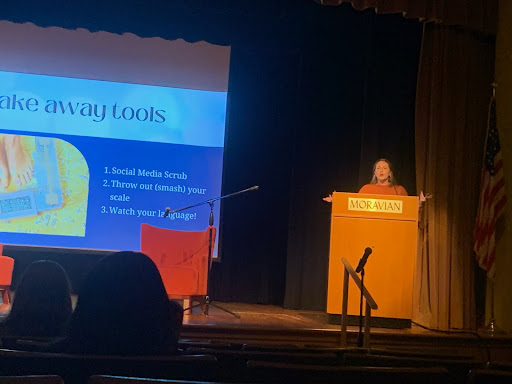Looking Down on Diet Culture

Katie Bongiorno lecture, Down with Diet Culture
Trigger Warning: This article includes potentially upsetting language, including body image, eating disorders, and unhealthy eating habits.
The Moravian Arts and Lecture program hosted The Down on Diet Culture Lecture on October 6, led by licensed mental health professional Katie Bongiorno, LMFT.
Bongiorno graduated from Thomas Jefferson University in 2017 with a master’s degree in family therapy and currently works for The Therapy Group. She began engaging in anti-diet culture in her late 20s after discovering how damaging diet culture is to mental and physical health.
The presentation hoped to inform college students about the misrepresentation of being overweight in the media and the dangers of dieting, especially unhealthy eating habits that can lead to eating disorders. The exhibition consisted of an interactive lecture and an anonymous Q&A session in which Bongiorno advised students on redefining their body image.
The guest speaker broke down what diet culture was and how it is harmful to bodies, especially younger and developing brains. She explained how the most common dieting techniques use dangerous starving procedures and unhealthy reward-system strategies to encourage weight loss.
Bongiorno stated that despite being one of the most common plans, starvation diets do not work in most situations and only promote a feeling of inadequacy in one’s body. These starvation diets are also taxing on the body, as they are not meant to support a caloric famine on a sustained basis.
Bongiorno offered a set of takeaway tools for viewers to break down diet culture’s impact on their lives. She told the audience to participate in a social media scrub and unfollow anyone they believed to cause harm to their mental health, such as promoting harmful dieting.
Bongiorno also encouraged throwing out one’s scale or smashing it to help release the rage diet culture has installed in younger generations. She motivated the audience to set boundaries and to disengage from diet talk, including speaking negatively about their own and others’ bodies. She especially discouraged commenting and complementing weight loss, as it is never known whether the weight loss was intended or healthy.
She discouraged working out to change one’s body and reminded the audience that exercise should exist for enjoyment. “Unlearn that exercise exists to grow, shape, shrink or sculpt your body, but for your health and happiness,” said Bongiorno.
She encouraged intuitive eating programs, such as Health at Every Size, which promotes pillars of weight inclusivity and eating for well-being rather than focusing on weight. “Your hunger is for you, alone, not anyone else,” she said.
She advised the audience that their healing, journey, and life depended on themselves. She observed that feeling unhappy in one’s body is not an emotion but rather a reflection of feeling insufficient in another aspect. “Feeling fat is not a feeling; it is a representation of feeling unsatisfied with something else. Replace fat with what you’re really feeling, like unworthy of love or ashamed,” said Bongiorno.
She discussed how the media had trained the mind to associate “fat” with “bad” and how quick-fix solutions such as Noom and The Wellness Diet still sneak in misinformation about health and weight. These apps attempt to create a sense of prestige for eating and working out “the right way,” furthering a sense of superiority over those perceived as overweight.
Bongiorno reminded the audience that the dieting industry is a $72 billion industry with a 95% failure rate, which urges those who do not lose weight to return to a different program. These industries often use unrealistic before and after pictures, photoshopping, unhealthy meal plans, and genetically predisposed models to influence consumers falsely. “Don’t play the comparison game because you are always going to lose,” said Bongiorno.
In addition to advertisements for quick fixes, Bongiorno told the audience that diet culture thrives in social media. Social platforms have introduced a new generation of body trauma, with normalized photoshopping and editing convincing adolescents that they are not good enough. Bongiorno examined how trends such as #thinspo and #fatspo have influenced further body trauma in newer generations, almost as a form of self-torture.
“Unrealistic expectations sink into our subconscious and influence our actions,” said Bongiorno.
She told the audience it might take time to reduce the influence diet culture has on their lives since thoughts and beliefs about weight and eating healthy are engraved in their brains. The presenter promoted creating new habits to relearn anti-diet culture to help facilitate this process. “Remember, nothing external will ever be enough to change your self-worth,” she said.
Diet culture is a topic that does not discriminate between gender, race, ethnicity, socioeconomic status, or location. It encourages looking down upon others, as a study found that 94% of teenage girls and 64% of boys have been body shamed.
Everyone can be affected by diet culture’s unrealistic expectations, and Bongiorno informed the audience that awareness is the first step toward a solution.
Biochemistry major Matthew Peiffer ‘26 said the lecture addressed an important topic. “People should not tell other people how to eat. No one should judge other people for their eating habits or for how they appear; everyone has their own right to their body.”
English and history major Mary West ‘22, agreed. “Picking at other people’s insecurities will not make you less insecure,” she said.






